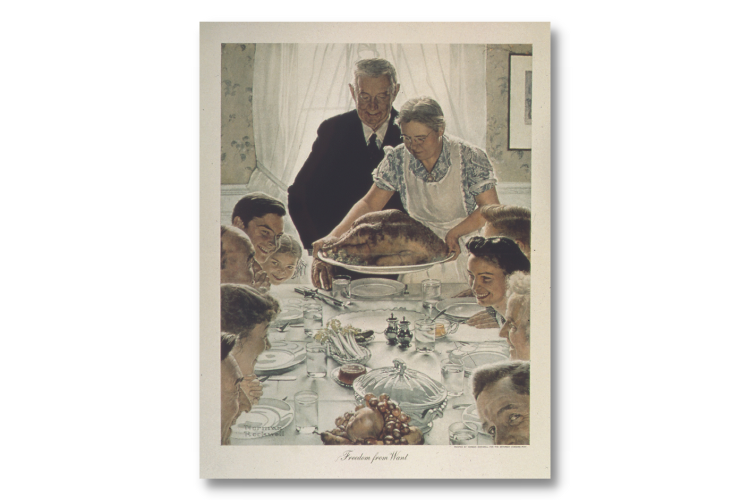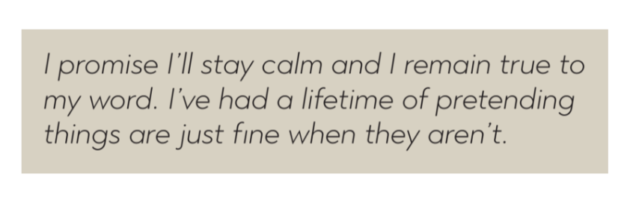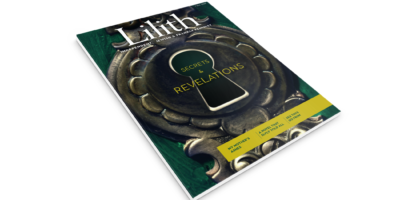
Freedom from Want
After mom remarries and moves out of our apartment in Co-op City in the Northeast Bronx, my sister Cindy and I begin hosting annual Thanksgiving dinners. I am nineteen years old and Cindy is twenty-one.
Our guest list each year shifts, but is always a mish-mash of people who have one thing in common—nowhere to go on Thanksgiving Day. Our mother and her husband Sully join us. We invite Sully’s ex-wife’s ex-best friend, who becomes a regular. Neighbors mention they have no plans when we meet in the elevator, and they come too. Boyfriends, later to become husbands. A cousin whose beloved mom just passed away. We purchase a Glatt Kosher meal for him, place it in the oven and forget until the kitchen fills with thick, black smoke.
Norman Rockwell’s famous Thanksgiving-themed painting called “Freedom from Want” is what we hope to replicate. When Cindy and I look at this picture, we see what family should be: elders providing nourishment to a group so used to receiving it, there is no need for any of them to look up from the conversation. Our childhood was spent dodging one parent’s anger and another’s mania, a minefield really. Experts at making order out of chaos, we turn our Thanksgiving dinner table into the best version of family the two of us can hope to imagine.
Cindy and I marry two men who are best friends and move within walking distance of each other. Bowing to the pressures of separate in-laws, we begin celebrating Thanksgiving together only every other year. We pick apart everything that happens at our table, and away from it, like one would a turkey breast.
When kids come along, Cindy and I fit in our chats while pushing strollers. Or we get right on the phone after returning from a full day at the park. My husband Ira marvels: What is it you two always have to say to each other? Everything. Conversation easily flowing into the next, one thought dripping into another. And so it goes.

I am having lunch with friends when Cindy’s husband Bruce phones. He has stepped out in the hallway of the radiologist’s office and tells me he’s not supposed to be calling. Cindy isn’t ready for me to know. A CT scan shows a patchwork of malignant lesions. The afternoon is warm and sunny, and the disconnect between the fair sky and unfair universe is not lost on me.
The next week, Cindy does not want me to go with her and Bruce to an oncologist appointment. I can’t deal with hysterics. I promise I’ll stay calm and I remain true to my word. I’ve had a lifetime of pretending things are just fine when they aren’t. In this one way, I’m well suited for navigating what lies ahead.
A blur of doctor’s appointments, hospital stays, treatments, surgeries. Five years’ worth. We go floor to floor at Memorial Sloan Kettering depending on which direction the cancer spreads. Cindy is 47 years old when she receives a diagnosis of Stage 4B colon cancer. For the first time, we don’t dare say out loud what we’re each thinking.
That year, we’re scheduled to spend Thanksgiving separately with our in-laws. Instead, Cindy says she wants me with her. My family piles in, joining Bruce’s extended family around their Thanksgiving Day table. Everyone speaks at once and I take in this beautiful scene, knowing this is the family I’ve always dreamed of having.
Between hospitalizations and treatments, Cindy gets back to teaching nursery school, helping her daughters with school projects, and the regular stuff of life. When a neighbor expresses surprise that Cindy is going to Disneyworld with her family, my sister wryly says the trip is through an adult Make-A-Wish gift. She doesn’t count on this being remotely believable, and we find it hysterically funny when it is. Does she really think my dying wish would be to go to Orlando?
The hospital’s security guards greet Cindy by name and garage attendants talk baseball with her no matter how long the line behind us. My sister knows everything there is to know about this game, diving right into conversations about batting averages, winning pitchers and bad trades. An orderly on the fourth floor runs up to the fifth to locate Cindy on his lunch break. He wants to know how she’s doing and exhorts her: “Don’t let anyone else escort you in.”
But the time comes when even this renowned cancer hospital has no treatment left to offer. A nurse sets aside a room on the seventh floor for as long as we need. Bruce and my nieces are with me. The girls, ages 16 through 20 years old, devise a plan to rotate sitting on either side of their mom holding her hands, ensuring that around the clock, we never let go.
Days blend into the next and we remain at our posts. We play Counting Crows and Beatles music, Cindy’s favor- ite. Nurses drop off food and coffee. The hospice social worker stops in. Rabbis from our Westchester synagogue visit. The nurse practitioner from Cindy’s oncologist’s office travels into Manhattan on her day off, something she tells us she does not usually do.
Before she is moved into hospice care, Bruce arranges for himself, the girls, and me, to have alone time with Cindy, to say whatever it is we need to while she is still conscious. I watch each of them go in ahead of me. Weeks before, my eldest niece Lori and I were in Florida with Cindy, going to spring training baseball games. My sister ordered meals at restaurants as if this were any normal vacation, but just played with the food. Still, I believed we’d have more time.
When it’s my turn to enter Cindy’s hospital room, she is pale, exhausted. I ask if she prefers just this once, we don’t speak, and she nods yes. The room is so quiet I hear the clock ticking. We look at each other and smile, conspiring one last time. If they ask, let’s say we talked about everything.
I haven’t been outside for nearly a week when Ira comes to get me from that hospice room. Cindy is gone. I go numb. As the car pulls away, I get that sinking feeling one gets when forgetting something.
During the second night of Shiva, the crowds of people in Cindy’s home overwhelm me. I alert a few friends I’ll be hiding in a closet in my niece’s bedroom. This seems like a sensible thing to do at the time; It’s so quiet there. A knock on the closet door and my friend Judith is beside me. “Karen, I’m sorry. People are asking to see you.” I can no longer hide and emerge on my own.
As we age, our closest friends usually are not our newest ones. Seasoned relationships are dependent on the milestones shared, the times we return to. Remember this. Remember that. Oh yes, I do! There are no buoys in place when entering a new friendship, nothing behind us to mark the way forward. Everything needs to be explained. Who has the strength to do that when at long last there is nobody left to remember that Thanksgiving dinner when…
These days, if I see my elderly neighbor deep in conversation with her identical twin on their daily walk, I think angrily, that should have been me. But is it right for me to feel cheated when it’s my sister who’s been robbed of watching her daughters grow older? Cindy is the one missing out on birthdays, graduations and eventually, weddings. Still, I cannot shake that nagging resentment accompanying me wherever I go.
After Cindy dies, Bruce and the girls celebrate Thanksgiving separate from us. Our holiday is spent with Ira’s brother and family. We are graciously invited in, sharing a well-prepared meal at a table set, oh-so beautifully. No dish will burn to bits here. Conversation will be sparked. How are you? I am fine. How are you? And so it goes. When the person who finishes your sentences is no longer around, there is so much less to say.
Thirteen years later, Thanksgiving still aims to break down pieces of that protective coating I’ve fashioned around me, a shell that repels grief from washing over me, because if it does, I fear I will drown.
Freedom From Want morphs into a wish for quiet, simply to lean into sadness. When the pandemic cancels Thanksgiving dinner in 2020, Ira suggests a hike in Bear Mountain State Park where we eat sandwiches at a viewpoint. We gaze out at an expansive scene of rolling hills, ponds and other peaks. A changing season: a world not quite finished with what was, while not ready to commit to what lies ahead.
Yet, even in the harshest of environments, nature ensures something new will grow. Each year, after the cousins go to separate dinners with relatives on their dad’s side, they find their way back together.
Now in their late 20s and early 30s, they create a “Cousins Giving” the weekend after Thanksgiving. Our children have their own stories to tell, jokes to share. It’s their holiday now. How I wish Cindy were here to see this; perhaps we’d have crashed the party.
Karen Bloom is a New York-based writer and a founding partner of Fund Up, a fundraising consulting company.


